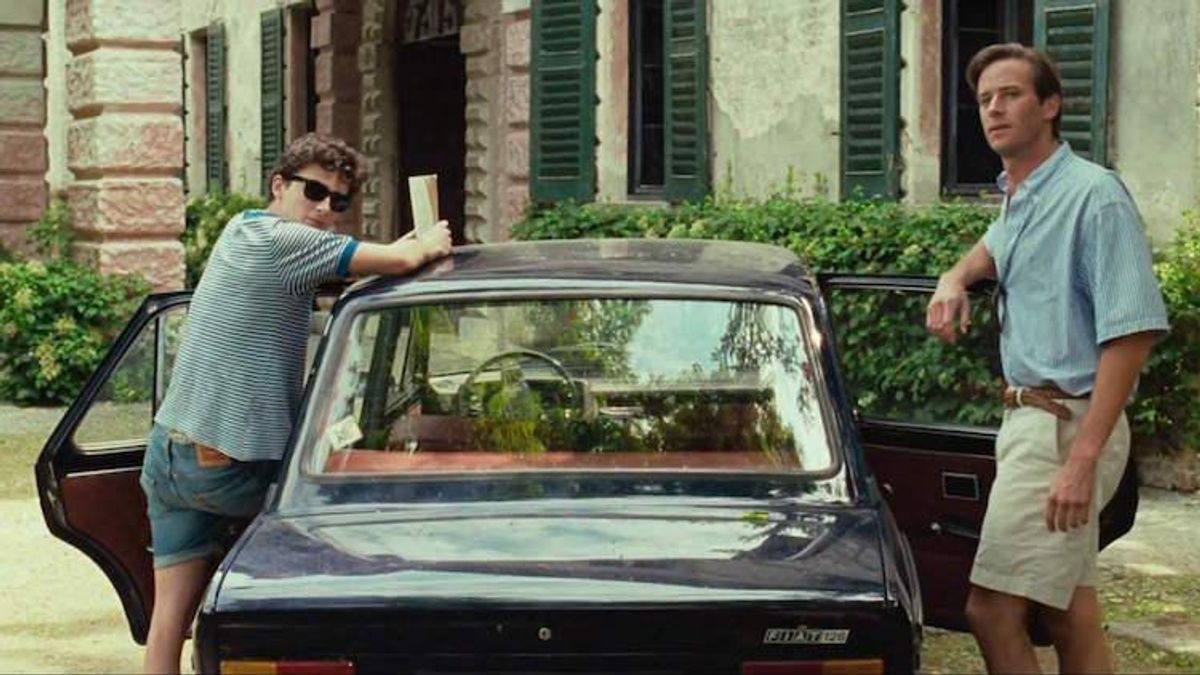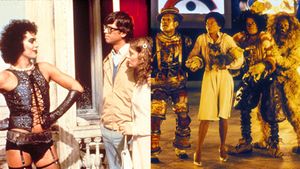A more honest title for Call Me by Your Name would be Call Me Your Bitch since it's as much a First Dump story as it is a First Love story. The way it indulges 17-year-old Elio's (Timothee Chalamet) sexual exploration with an older man, Oliver (Armie Hammer), inspired a friend to suggest the film might have worked better as a murder mystery. Something untrustworthy is going on here. The film is suffused with such mysterious solemnity that its simple getting-laid tale seems out of proportion with the universal reality of horny teenage passion.
Filmmaker Luca Guadagnino confirms his special, curious place in contemporary film culture with this banal but highly acclaimed movie. As a Tilda Swinton protege (he directed her in I Am Love and A Bigger Splash), Guadagnino enjoys that elite cache even though he fools around with only nominally gay subjects (a rebuke to Tilda's own fearless mentor Derek Jarman).
Queerness is merely the subtext in each of his movies so far. Guadagnino's real interest seems to be materialistic: He makes swanky, Euro-set melodramas about the sex lives of the rich and immodest.
Related | Call Me By Your Name's Most Important Lesson: Allow Yourself to Feel
Elio Perlman's initiation is, essentially, a romantic fantasy that takes for granted the privilege of growing up rich, the son of aristocratic parents--an American art professor father (Michael Stuhlbarg) and erudite Italian mother (Amira Casar). As Elio summers "somewhere in Northern Italy" in 1983, he enjoys absolute freedom, especially when Oliver, his father's academic assistant, arrives to help annotate a collection of Praxiteles slides (a visual tip-off to savvy viewers during the film's opening credits).
In this fantasy, Elio is a peculiar child prodigy: a cultured pianist, specializing in classical music, he's uninterested in his peers (except for insensitively dallying with a local Italian girl). But Oliver, a big, tall, Ivy League American, excites Elio. Is it envy of his father's attention or fascination with Oliver's passing-for-WASPness, a reminder of Elio's own shared Jewishness?
But Call Me By Your Name offers a scenic travelogue of Elio's puppy-dog obsession more than it explores ethnic identity. Sexual identity is also vague (except for fetishistic visual etudes like a pair of swim trunks drying on outdoor faucets and the sweaty exertion of men's long bicycle rides). Yet, this vagueness is as subtle as a Pride float in Rio's Carnaval parade.
Nothing that happens here is surprising which makes Elio and Oliver's sex predestined--not romantic. That's also why one might suspect something as profound as a murder mystery would occur--something truly momentous should resort from all the long build-up. Yet, neither guy (each one a pretentious intellectual; they start out comparing egos before penises) seems particularly lusty until Elio becomes snottily possessive. His most humane and youthful moment is mocking Oliver's tony dialect, a sign of his childish dependence. So when Oliver's life back in the States takes precedent, Elio's teary-eyed petulance is far from a devastating tragedy.
Narcissism is Elio's problem but it is also the film's failing. Instead of powerfully exploring gay passion as in this year's Paris: O5:59 and God's Own Country, Guadagino's movie is regressive. It harkens back to a pre-Stonewall sensibility in which closeted emotions are inflated due to an out-dated, introverted and mostly inept sensibility. The film's screenplay by veteran filmmaker James Ivory (director of the stuffy A Room with a View, Maurice, Howards End) is cloaked in an aura of taboo which makes no sense for a millennial film--except that it appeals to hidden guilt; an ironic but essentially narcissistic need to valorize one's sexual longing. This accounts for the film's bizarre coming-out scene--not by Elio but by his father who offers consent to his son's relationship with Oliver, repeatedly calling it a "friendship." His discretion is so queasy, one suspects that working with Oliver on all those slides of male nude sculptures inevitably unleashed his own closeted jealousy.
Related | Telling Armie Hammer to 'Man Up' Isn't Going to Help Hollywood's Diversity Problem
Confused by lust (and his father's unhelpful ego), Elio's narcissistic pretense about his "friendship" with Oliver prevents him from understanding sex in its fuller ramifications such as the men in Paris: O5:59 and God's Own Country come to learn. This confusion makes Guadagnino's film the same kind of con-job as Brokeback Mountain which turned natural feelings into maudlin grief--this time in the patronizing figure of an adolescent. So this is also Moonlight, Part 2.
About that maddening title: It's a whispered demand meant to be answered by "...and I'll call you by mine." But this sweet nothing is as sappy as the now-famous, laughable and literally sappy scene of Elio masturbating with a peach. Oliver finds the juicy pulp yet Guadagnino (or is it Ivory) refrains from the moment's obvious vulgar conclusion.
I doubt if Gregg Araki or Bruce LaBruce would be so high-minded, yet neither of those filmmakers have ever received acclaim like this super-bourgeois fantasy. Call Me By Your Name is one of those movies that exploit the queer audience's romantic needs by packaging them and falsifying them. I'd have more respect for this kind of craven commercialism if it was a queer version of Porky's.



















































































